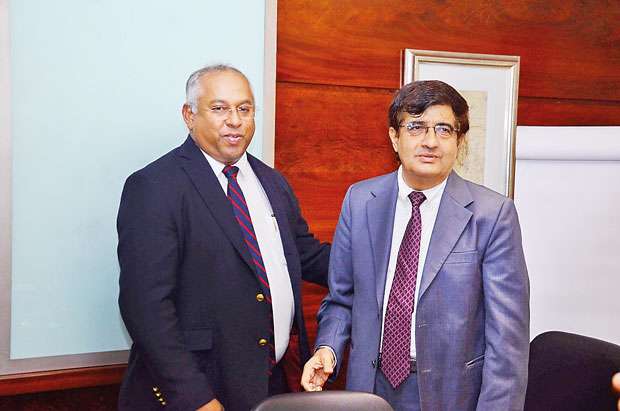23 Aug 2018 - {{hitsCtrl.values.hits}}
 From left: DIMO Group CEO Gahanath Pandithage with Tata Motors Limited President Passenger Vehicles Mayank Pareek
From left: DIMO Group CEO Gahanath Pandithage with Tata Motors Limited President Passenger Vehicles Mayank Pareek
Pic by Waruna Wanniarachchi
By Nishel Fernando
Tata Motors, a member of India’s Tata Group, expects Sri Lanka’s motorcar market to more than double by 2022 while the motor car penetration is also predicted to be doubled in the period.
“Sri Lanka’s car market should more than double during the next three to four years. We should see the car market more than doubling to 120,000 by 2022,” Tata Motors Limited President Passenger Vehicles Mayank Pareek told a media roundtable discussion, in Colombo, this week.
He said only 47 people own a car for every 1000 people, which is very low for Sri Lanka. He predicted that car ownership should be increased to 70 to 80 per 1,000 people in the next couple of years, driven mostly by 1200cc range cars.
Pareek noted that Tata views Sri Lankan market as a “positively-poised” market for the future.
“Sri Lanka is a young country with a young population with a growing per capita income. Sri Lankans are aspirational; they want to consume the latest products.”
Further, he pointed out that Sri Lanka’s road infrastructure is also relatively good to accommodate the increase in car population.
According to the Transport and Civil Aviation Ministry, Sri Lanka’s motor car population stood at 756,856 units by end-2017, while 39,142 new motorcars were registered in 2017.
When queried about the possibility of setting up a vehicle manufacturing or assembly plant in Sri Lanka, Pareek opined that a stable policy environment is the key for Tata to consider setting up such a plant.
He said Tata Motors has already planned out its expansion plans for the next five years and said Tata needs to see some stability in sales volumes in the Sri Lankan market to consider opening up an assembly or manufacturing plant.
DIMO Group CEO Gahanath Pandithage opined that it’s not viable for any company operating ethically to set up a vehicle assembly plant in Sri Lanka as there are no large duty advantages or space for backward integration.
“Ethically it cannot become profitable businesses,” he stressed.
Pandithage also lamented the frequent changes to the import duty structure for motor vehicles, which limits the investments in the sector due to unpredictability.
“Suddenly when you get up in the morning, the taxes have changed. So we can’t plan things, when the duties are decreased, we try to invest and then the taxes are again increased in the next budget,” he said.
He urged the government to create a level playing field by setting up a long-term import tax structure.
Meanwhile, Pareek emphasised that Sri Lanka is fast becoming a used vehicle dumping yard and suggested that the government should encourage the import of brand-new vehicles similar to India, which does not permit the import of used vehicles.
Speaking of emergence of ride-sharing services and its impact on vehicle sales, Pareek was confident that the ride sharing service wouldn’t impact the motor car market. However, he said the ride sharing industry is changing the buying patterns, on what’s for car being used.
“Ride sharing services have been in the US for last eight years. But the US car market hasn’t gone down. It’s still growing at a healthy rate and it’s a similar situation in China. It’s like when restaurants came up people didn’t stop cooking at home,” he said.
Meanwhile, acknowledging electric vehicle market as the future Pareek noted that high battery costs is impending the growth of electric vehicles.
According to him, the battery cost amounts to 70 percent of the cost of a typical electrical vehicle. However, the battery prices have fallen significantly from US $ 800 per kWh four-five years ago to US $ 250 per KWH now.
Pareek noted that the charging infrastructure and range are the other issues that impede the growth of electric vehicles.
Pandithage suggested that Sri Lanka should look at solar power to charge electric cars in order to bring down the running costs.
Pareek revealed that Tata is currently working on developing a new electric car with a 350km range.
Tata recently launched its electric vehicle, Tata Tigor, which is being sold to the state-run Energy Efficiency Service Limited, which has a range of 100 km with a top speed of 100 Kph.
Pareek noted that its Nano imports to Sri Lanka have been halted as they don’t have some BS4 standard required in Sri Lanka.
17 Nov 2024 17 minute ago
17 Nov 2024 2 hours ago
17 Nov 2024 4 hours ago
17 Nov 2024 4 hours ago
17 Nov 2024 4 hours ago